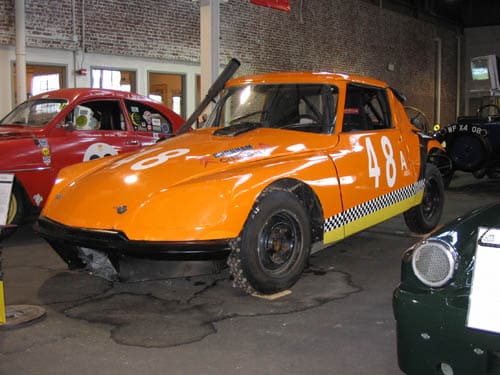
Citroën DS Ice Racer- 1966
This car was purpose built by Dave Burnham who began his career in the world of Citroën by accepting a job as a mechanic in John Carmichael’s Citroën dealership...
DAILY DEMONSTRATIONS AT 11AM, FREE WITH ADMISSION!
Please note that the cars or exhibit items shown in this database are part of our collection but may not be on display when you visit.
This car was purpose built by Dave Burnham who began his career in the world of Citroën by accepting a job as a mechanic in John Carmichael’s Citroën dealership...
The Citroën D series was the sensation of the 1955 Paris Auto Show. With its advanced hydropnuematic suspension and leading edge styling, the D series was an instant success....
When the Citroën D Series or DS (pronounced DAY-ess and sounding quite appropriately like the French word for goddess) was introduced at the 1955 Paris Auto Salon, it turned...
Officially announced in 1967, the Dyane was conceived both as a modern version of, and an eventual replacement for, the venerable 2CV. Using the engine, suspension, and chassis of...
By the late 1960s, Citroën, General Motors, AMC and others viewed NSU’s new rotary, or Wankel, engine, as the wave of the automotive future. Compact but powerful, it allowed...
The Citroën GS (which means mass production in French) is a passenger car model with flowing lines that was introduced in 1970. Its hydraulic system, hydro-pneumatics, was derived in...
The H-Van was simple to maintain, cheap to run, and durable, enabling the French to have their goods to market after WWII. Its distinctive corrugated sheet metal bodywork was...
The Citroën D series was the sensation of the 1955 Paris Auto Show. With its streamlined silhouette and its hydro-pneumatic suspension (no springs), this car had many features that...
In the late 60s Citroën, like many other car manufacturers, thought that rotary power might be the wave of the future. The M-35 prototype was the first rotary- powered...
Introduced in 1968, the Mehari was a new multi-purpose, all terrain pick-up joining Citroën’s family of light, flat-twin vehicles. The Mehari was originally designed with a plastic body which...
Introduced in 1968, the Mehari was a new multi-purpose, all terrain pick-up joining Citroën’s family of light, flat twin vehicles. The Mehari was originally designed with a plastic body...
In 1997 Citroën and Peugeot came out with an electric car based on the compact 106 Series cars. The car was powered by an electric DC motor and 20...
The SM came into being as a pure experiment. With the exception of small, low-powered cars, Citroën was practically alone in building front-wheel drive models. Worried that other manufacturers...
The Citroën “Traction Avant” (translated as “front drive”) was introduced in 1934 as the 7A; this 15-Six model was introduced in 1938, and was a radically different concept from...
The Citroën Type 350 (series n) was launched in 1964. Design of the body, with strong similarities to its predecessor the Ami 6, was the last work of designer...